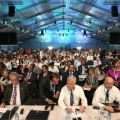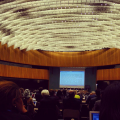Efficiency at Day 2 of ADP2.8
Laima Politajs | February 9, 2015.
Day two of the UN climate change negotiations, or according to Kiribati the “most crucial meeting for humanity”, in Geneva saw a greater sense of urgency. And urgency is indeed needed on many levels: from the language that appears in the text to what governments are willing to implement domestically. After five sessions—89 presentations over the course of three years—the final Structured Expert Dialogue (SED) also concluded yesterday reinforcing the need for urgency through highlighting that even 2˚C of warming is intolerable.
Often criticised for being a slow process, Geneva has seen UNFCCC negotiators seemingly internalising this call, with the speed of negotiations surprising some observers. Initially amusing to delegates, the new ADP co-chairs have chosen to systematically approach these negotiations point by point, literally from A all the way through to Z. Even though it has led to some duplication here and there, it has allowed for efficiency.
Yesterday led with morning discussions on adaption. Multiple governments called for the inclusion of loss and damages into the section of the text on financing after its contentious removal in the final moments of Lima. A separate section on loss and damage could lead to more flexibility and durability with Paris in mind.
Afternoon discussions on finance, technology transfer and capacity building followed with “quick and efficient” procedure, as praised by Brazil. The remainder of these initial discussions were set to wrap up Tuesday morning.
As mentioned by The Verb yesterday, INDCs, intended nationally determined contributions, are very much a hot topic in Geneva. However, much is still unclear with how these submissions will be aggregated, or the need for both mitigation and adaptation ambition will be balanced. The UNFCCC, UNEP, and French and German governments outlined their initiatives intended to support developing countries financially and with capacity building in relation to the INDCs last night.
Negotiations are progressing relatively smoothly in Geneva, but the emergence of old battle lines may still emerge later today when discussions on streamlining begin.
With reporting from Linh Do.













comment